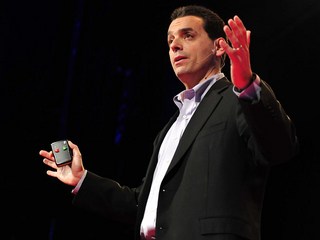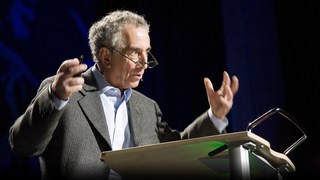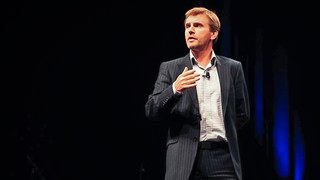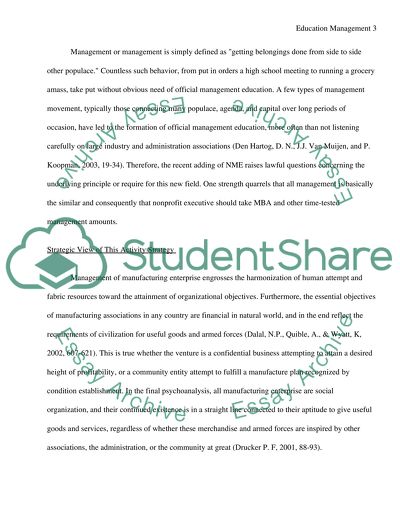Importance of Educational Management Essay
Introduction, example of educational management, conclusion of educational management.
Due to the confusion that exists between leadership and education management, most school managers/leaders cannot seem to define what education management is and this has made it extremely difficult to eradicate the confusion existing between the three concepts. This necessitates that school managers understand what entails education management.
This paper therefore explores the most fundamental components of educational management; components that help determine what educational management is via scrutinizing how education management has transformed over the years and discussing the impact of education management in schools. This will basically pave way for having an in-depth understanding of educational management and eradicate confusion that exists between different concepts related to education management.
The major purpose of education is developing students’ capacities and potential. As a field of practice, Bush & Glover (2002) indicate that education management focuses on how education managers coordinate the institutions’ activities (operations) in attempt to ensure that there is effectiveness and efficiency in meeting the goals set (capacity development).
Education management overlaps with administration and leadership concepts. Additionally, Bush (2003) notes that the term ‘management’ is commonly used in Britain and Europe while in Canada and United States, the term ‘administration’ is preferred. This has led to competing education management definitions and understanding.
As a result, most school leaders have difficulty balancing between school operations (management), leadership, staff and student performance improvement and administration or lower-order duties.Therefore, this paper seeks to conceptualize education management or rather find out what education management is and it impacts in schools. This will help school leaders understand the context of education management and avoid confusion that exists between administration, management and leadership.
Basically, managers are involved in leading, organising, planning and controlling educational institutions. This explains why education management overlaps with leadership; education managers must incorporate managerial leadership.
As Sharma (2009) notes, in managerial leadership, the focus is on tasks, functions, and building rational behavior within the organisation. This shows that managerial leadership assists in managing the activities that exist successfully, hence showing the inseparability of leadership and education management. Unfortunately, the managerial leadership model present in educational management is normative, outline how persons in schools ought to behave and define leadership by how effective organisations are.
These formal education managerial leadership models have major weaknesses; focus on the entire institution and underestimate individual contributions, exhibit a decision-making process with difficulties (managers cannot substantiate the choices made) and power is concentrated at the apex (principals have all the power, top-down or one way leadership). Automatically, this hinders the managerial efforts and explains the confusion existing between leadership and education management.
As Ciulla (2008) notes, the confusion can only be eradicated by conceptualizing education management, determining what educational management is and how it has impacted schools. This will help leaders operate within the educational management concepts and eradicate confusion.
Sharma (2009) notes that during and before the 1800s, management of education was unskilled, managed by the same people who governed communities. For instance in United States, the school system was under a district Agent who oversaw all managerial and administrative tasks.
During that time, critics argued that education was overly bookish and could not cater for varied talents. This is because education fell short of the expected quality; there were no trained teachers and no standard methods for storing information. This gave rise to the need for practical managerial skills.
At first, preachers and local businessmen took over schools and used unsophisticated skills to run them but in the 1900s, schools became more bureaucratic thus requiring unavailable administrative skills.
It became clear that training in educational management was needed and education management first evolved as an educational topic in Columbia University, United States. The focus was on educational controls such as functions of different individuals in schools among others but with time, management principles in commerce and industry were adapted by the management education system.
This marked the evolution of educational management theory giving rise to conceptual frameworks and theoretical knowledge needed for managing schools. The 21 st century has now seen practitioners and theorist develop managerial models that meet specific needs of educational institutions and educational management is now a conventional field governed by its own research and theories (Wankel, 2002).
The impact of educational management can be well elaborated by a research conducted by Poster (1988) in Center for Study of Comprehensive Schools.
Most school managers attested that education management has been fundamental in managing staff, technological changes, conflicting viewpoints existing between teachers and students, available resources and changes in market (education quality and standards). Additionally, most attested that educational management concepts enabled them plan, control and organise school operations.
As a result, most managers acknowledged that their schools had made major improvements towards ensuring that students had a firm basis in life (had endowed facilities, well trained teachers and offered wider education curriculums). This clearly indicates that education management has basically managed to turn-around schools; ensure that school operations are well aligned to address the needs of the school at large.
Basically, what we can learn is that educational management has changed the facet of schools from unproductive disorganised schools (poor quality of education and improper information storage) to productive organised schools (staff management and talent management).
As we can see, this is because education management has enabled school managers to plan, control, lead and organise school operations for the purpose of ensuring that students’ potential and capacities are developed. This is because educational management functions form the basis of all schools operations executed by school managers. We can therefore say that the fundamental managerial components (planning, controlling organising and leading) form the basis of what education management is.
When it comes to educational management, Wankel (2002) indicates that school managers are multifunctional and thus need to maintain total quality management, come up with staff performance appraisal schemes, tackle job satisfaction, occupational stress and coping actions, and also manage time effectively.
This necessitates proper planning (defining goals and coming up with development plans/strategies for achieving them) of school’s operations, a clear indication as to why planning is outlined as a major managerial component in the sample case.
When it comes to capacity development, managers are expected to adapt a skill developmental approach where training is undertaken at a personal and team level, technical assistance is offered to students undertaking projects and the school networks with research institutions and other educational institutions. For these reasons, school managers are expected to lead; motivate subordinates/ teams/individuals as they work and organise or distribute tasks for effective capacity building.
Additionally, capacity development is a long-term process that requires evaluation and monitoring. This requires proper controlling or monitoring of performances, comparing performance to the expected standards and coming up with corrective measures.
Cumulatively, we can now say that education management is planning, controlling, organising and leading in school operations with the purpose of capacity building and addressing the needs of the school at large. As we can see from the case study sample, the progress made in schools (capacity building and addressing the school needs effectively) can all be attributed to proper planning, organising, leading and controlling of the school operations.
Bush, T. (2003). Theories of educational management: Third edition . London, LDN: Sage.
Bush, T., & Glover, D. (2002). School leadership: Concepts and evidence . Nottingham: National College for School Leadership.
Ciulla, J. B. (2008). Leadership studies and “the fusion of horizons”. The Leadership Quarterly 19 (4), 393-395.
Poster, C, D. (1988). Partnership in education management. London, LND: Routledge.
Sharma, S. L. (2009). Educational management: A unified approach of education. New Delhi, ND: Global India Publications.
Wankel, C. (2002). Rethinking management education for the 21st century. North Carolina, NC: IAP.
- Chicago (A-D)
- Chicago (N-B)
IvyPanda. (2023, October 30). Importance of Educational Management Essay. https://ivypanda.com/essays/what-is-education-management/
"Importance of Educational Management Essay." IvyPanda , 30 Oct. 2023, ivypanda.com/essays/what-is-education-management/.
IvyPanda . (2023) 'Importance of Educational Management Essay'. 30 October.
IvyPanda . 2023. "Importance of Educational Management Essay." October 30, 2023. https://ivypanda.com/essays/what-is-education-management/.
1. IvyPanda . "Importance of Educational Management Essay." October 30, 2023. https://ivypanda.com/essays/what-is-education-management/.
Bibliography
IvyPanda . "Importance of Educational Management Essay." October 30, 2023. https://ivypanda.com/essays/what-is-education-management/.
- Learning to Organise Risk Management in Organisations
- Capitalism, Democracy and the Treaty of Waitangi are Three Ways Through Which We in Aotearoa ‘Organise’ Ourselves
- Leadership of a Consultancy Group: Project Planning and Organising
- Organising A New Year Party
- Skills of Management: Organising, Coordinating, and Controlling
- The Wollongong Music Festival Arranging
- Labour Monitoring and Control
- Self-Organizing Teams: How Its Work
- Managing Innovation: Creativity, Chaos, Foolishnes
- The Importance and Relevance of Critical Thinking in Both the Classroom and the Outside World
- How Students Develop Creative Peanut Butter and Jelly Construction Skills: Thinking Outside the Breadbox
- The Role of the Assessment in Education
- Transfer of Training: Concept and Challenges
- The Free Online Dictionary Wikipedia

Introductory essay
Written by the educators who created Leading Wisely, a brief look at the key facts, tough questions and big ideas in their field. Begin this TED Study with a fascinating read that gives context and clarity to the material.
Understanding management means understanding people. What motivates us to engage deeply and perform powerfully at work? How do we inspire that in teams? What are the best ways to organize ourselves to exploit opportunities and solve problems? These are critical questions for all leaders who share the goal of thriving in a global, digital, fast-paced future.
There are countless ways we can approach those topics, and diverse perspectives to consider—as is evident from the thousands of management manuals, podcasts, executive seminars and more. For example, among the TED Talks included in Leading Wisely, Itay Talgam shares a lyrical metaphor on the style of the great conductors, while Clay Shirky delivers a statistical deconstruction of the power of informal networks. It's precisely this enormous scope and variety that defines the reality of modern management and which makes it so fascinating, and so vital. Modern thinking on management — from teaching and research inside universities to the way the world's most revered businesses organize themselves — has continuously evolved throughout the 20th and early 21st century. What's more, the pace of this evolution is increasing: the TED Talks in this collection cover a number of topics that didn't even exist ten years ago! This means successful managers must learn quickly, forecast trends and execute wisely.
Division of labor and beyond: Management theory is born
Industrialization shaped the work of the first management theorists in the US and Europe, where efforts to perfect new production processes gave management a practical focus and scientific method. Mining engineer Henri Fayol was one of the first to set out clear principles of management, which were formed through experiences organizing labor and machinery to extract coal in the most cost-efficient way. In the early decades of the 20th century Fayol identified six core principles of management: forecasting, planning, organizing, commanding, coordinating, and controlling. A century later, these key principles still shape our ideas about management, even though we may implement them in more sophisticated ways.
In Fayol's time, managers enacted these six principles through authority and discipline, and the regimentation of that approach created as many problems as it did advantages. For example, perfecting production techniques through the division of labor involved a systematic breaking-down of production into repetitive, individual tasks, or 'piece work'. This formed the foundation of a new mass-production economy and significantly improved the standard of living for many workers and consumers--but the work was often tedious and didn't draw upon the worker's ideas or abilities in any meaningful way.
Fayol's contemporary, Henry Ford, provides the most famous example. In his quest to mass-produce an affordable automobile, Ford identified 84 specific steps required to assemble the Model T and hired Frederick Taylor, the creator of "scientific management," to conduct time and motion studies on the factory floor. In this way, Ford reasoned, he would know exactly how long it should take his workers to complete each of the 84 steps, and he could direct the exact motions each worker should use so that the assembly proceeded with maximum efficiency. Ford also reasoned that he could reduce the time spent on each task if his workers didn't have to move from one assembly to the next. So in 1913, inspired by a grain mill conveyor belt he'd seen, Ford introduced the first moving assembly line for factory production.
Only a year later, Ford surprised everyone when he announced that he would double wages and reduce working hours at his Detroit auto plant. Wall Street investors were dismayed. Media around the world reported Ford's announcement as a philanthropic gesture, or speculated that Ford was trying to create a bigger market for his Model T by creating a new middle-class American workforce. The reality? Ford realized he could lower turnover, and the costs of recruiting and training new employees, by offering better conditions and pay.
Beyond efficiency: Valuing people
When he raised wages and shortened the work day, Ford signaled that employee satisfaction was an essential element of successful management. There was a growing appetite to understand workers in this context and, more than that, to take a sociological or even anthropological viewpoint.
Although sociologists like Emile Durkheim had begun this work in the late 19th century, the backlash against division of labor gained momentum in the 1920s and '30s, when the horrors of the First World War fueled disillusionment with wide-scale mechanization. Many felt that workers were treated as machinery measured by volume of production alone.
In contrast, Elton Mayo highlighted the importance of social ties and a sense of belonging in the workplace. In Mayo's view, managers had to acknowledge these needs and listen to their employees, in order to make workers feel valued.
Mayo's ideas originated in part from his work at the Hawthorne General Electric Plant in Chicago, where he measured the effect of lighting levels on employees at the plant. Mayo found that simply taking an interest in the activities and opinions of staff produced a motivating effect—though when his work concluded and the plant returned to business as usual, productivity dropped.
Although Mayo championed a different kind of dynamic between managers and their subordinates in order to improve conditions and increase output, workers were given no real decision making power. Nevertheless, his work advanced management theory in a significant way, and decades later we can appreciate its influence on the people-oriented, more democratic operation of many modern companies like Semco. Its CEO, TED speaker Ricardo Semler, acknowledges that "it takes a leap of faith about losing control" to reorient a company so that it truly takes care of its people and treats them as its most important asset.
The new leader
As our conception of the workforce changed – from assembly lines of replaceable robots in the era of Fayol and Ford, to individuals with diverse talents to empower (and exploit) today — so has the role of the leader. The command-and-control approach – appropriate and effective in factory-like environments – has given way to newer, more nuanced approaches to leadership that lean more heavily on inspiration and persuasion.
Modern management theorist and TED speaker Simon Sinek believes that great leaders inspire action because they think, act and communicate from 'the inside out'—beginning with and focusing primarily on their core beliefs and values. Sinek suggests that people, whether they're your employees or customers, "don't buy what you do—they buy why you do it." Hiring people who understand and embrace these core beliefs and values, Sinek claims, means they don't work just for a paycheck—they work with "blood and sweat and tears."
When people see their work in this way, the rules and incentives that leaders have leaned on in the past to manage and motivate employees may be unnecessary. In fact, as TED speakers Dan Pink and Barry Schwartz observe, they may actually do harm. Pink shows through a series of surprising experiments that traditional carrot-and-stick motivators like bonuses and pay-for-performance plans can actually decrease creative thinking and employee engagement. What's more, according to Barry Schwartz, these incentives, coupled with an over-reliance on rigid procedures, "cause people to lose morale and the activity to lose morality." Schwartz believes that moral skill, moral will, and practical wisdom are absolutely essential if organizations want to deal with complex challenges in a smart and timely way.
The importance of innovation
Up to now, we've focused on how we organize resources—and in particular, human resources—to complete tasks and meet our goals. However, this alone doesn't equip managers to launch a successful startup to compete in a fast-moving global marketplace, or to keep pace with consumers' changing values, wants and needs. Innovation and marketing are central tenets of modern management, too. How do you harness market knowledge to position yourself as distinctive and essential, and to predict what people will want and use? How can you empower team members to come up with ingenious and elegant ideas?
In an earlier era, innovation often occurred in the first stage of production, which involved creating the product blueprint; innovation may also have altered the production process in order to bring costs down. But today, organizations increasingly aspire toward innovation at all stages, in order to compete and to thrive.
To enable innovation, leaders encourage a diversity of perspectives and empower employees to contribute in unconventional, 'left-field' ways; quite often, this plays out in ways that contradict the chain of command and strict discipline which characterized early management theory. For example, some companies formalize the freedom to experiment with 'left-field' ideas in programs like Google's "20% time" and Apple's "Blue Sky" program; these provide contractual 'free time' for employees to work on their own projects, which the company may later adopt and launch. (It's worth noting that this idea goes as far back as Edison, who encouraged a young Henry Ford to play around with combustion engines in his spare time while Ford worked at Edison's light bulb manufacturing plant.)
Ideas from everywhere: The new "crowd-sourced" workforce and on-call experts
Along with enabling creativity within their teams, in recent years, forward-looking organizations have become more sophisticated in harnessing participation from the public. Through social media platforms, open-source development environments and other collaborative tools, we're increasingly able to amass ideas from around the globe, and from people traditionally considered 'consumers' rather than the 'producers' of our organizations' goods and services.
This signals a profound reversal from Henry Ford's earlier efforts to gather people under one roof around a specific task; rather, as TED speaker Clay Shirky notes, we're now able to take the question or task to the people—who may not be 'employees' as we've traditionally thought of them, and who may never meet us face-to-face in our offices. Shirky predicts that in the coming decades, loosely coordinated groups will be increasingly influential and that "one arena at a time, one institution at a time" more rigidly managed organizations will move towards different and more open methods of management.
The technology that enables crowdsourced solutions also allows leaders to tap 'expert' knowledge from around the world. We have instant access to advice from thought leaders and consultants when we're overwhelmed by the array of information and the pace of innovation in today's world—but then managers must discern what's most helpful to achieve the organization's goals, filtering out what is and isn't useful. What's more, we need to be judicious about when and how we call in the experts: in her TED Talk, Noreena Hertz argues that the constant urge to defer to experts is damaging our ability to think independently and solve our own problems. Indeed, as you make your way through the talks in this TED Study, you'll need to decide for yourself what best applies to you and your team.
All work and no play: The need for balance
Today's technology enables managers and their teams to be connected to the office 24/7, if we want to be, and organizations can draw on workforces from all over the world, at short notice. This creates amazing opportunities and thorny problems for managers. For example, how should a manager interact with employees who may be scattered on several continents, working for multiple employers on several simultaneous projects?
Technology companies developed ways to manage the 'scrum' of work and organize loose networks of employees and stakeholders, in order to coordinate a wide range of activities. Outside the tech sector, these concepts are becoming increasingly central to modern management.
Even in a more standard office environment, the challenges of prioritizing and maintaining efficiency have multiplied. The stereotypical modern open-plan office with its endless meetings and distractions can make the idea of single-minded, creative problem solving seem impossible, as Jason Fried notes in his TED Talk "Why work doesn't happen at work."
It would be difficult to explore the evolution of management without also considering the evolution of work itself. How much work do we actually want to do? And how much are we able to do, before it starts to adversely affect our lives and the organizations we work for?
Striking the right balance between our professional and personal lives is becoming easier and more difficult. For example, our ability to connect to the office 24/7 provides flexibility, but it also means managers and their teams may be tempted—or expected—to put in more hours than ever before. TED speaker Nigel Marsh suggests that workers need to set and enforce their own, individual boundaries, but he doesn't let their employers off the hook: managerial (and organizational) duty of care must come into play. This is a huge societal issue, one that's measured by national governments and critical to our individual health and happiness. But it's not solely an altruistic appeal—for organizations with an eye on productivity, employee engagement and retention, it's simply smart business.
Facebook COO and TED speaker Sheryl Sandberg is particularly interested in the challenges that many women face as they advance in their professions and become wives and mothers. Although many fathers undoubtedly feel these pressures as well, Sandberg notes that by and large it's women who are dropping out of the workforce, and this means that women are all too often conspicuously absent from the top levels of governments, corporations and other organizations. Sandberg asks managers to consider what messages they're sending to the young women in their organizations, and to create ways for all people to engage fully at work so that we benefit from their diverse and valuable perspectives.
Sandberg is candid about her own struggles with work-life balance, and her example is also interesting because it touches on so many of the other issues that we've raised in this introductory essay. Facebook is a company of 7,000 employees working across 15 countries, constantly striving to meet the needs of its more than one billion users and figuring out how to harness the power of that global network. It must continuously innovate to maintain its leadership position as social media proliferate at an amazing rate. Executives like Sandberg must nurture the talent and creative thinking of team members who fuel that innovation—or risk losing them to others who may offer more appealing opportunities.
Get started
Let's begin Leading Wisely with TED speaker Itay Talgam, who uses a musical metaphor to illuminate the evolution of management and describe different leadership styles in "Lead like the great conductors".

Itay Talgam
Lead like the great conductors, relevant talks.

Simon Sinek
How great leaders inspire action.

The puzzle of motivation

Barry Schwartz
Our loss of wisdom.

Noreena Hertz
How to use experts -- and when not to.

Clay Shirky
Institutions vs. collaboration.

Sheryl Sandberg
Why we have too few women leaders.

Nigel Marsh
How to make work-life balance work.

Jason Fried
Why work doesn't happen at work.

Educational Leadership and Management
Scholarly papers may describe the results of experiments or research or be more theoretical, offering new research approaches or conceptual frameworks. Hallinger’s (2013) paper provides a conceptual framework for conducting systematic reviews so that the description of the results meets the standards for publications. The author focused on educational leadership and management, studying the reviews conducted in this field and highlighting the approaches used to create his unified model. Consequently, Hallinger (2013) identified five questions that make up the conceptual framework and eight criteria for the quality of the review. Even though such articles are not empirical and have some limitations, they may be helpful for research.
Conducting systematic reviews can be helpful for various disciplines and researchers. Hallinger (2013) notes that they can bring research and practice closer. Moreover, reviews help to systematize and validate existing studies by highlighting significant and reliable findings. Conceptual articles can also contribute to other research by providing them with convenient tools and concepts to use. However, such studies may have limitations; for example, combining all the necessary data in one article is complex and carries the risk of error and bias. At the same time, conceptual papers require much effort and time but have limited possibilities for application.
Despite all the highlighted limitations, I can apply such an article in my dissertation work. First, reviews identify gaps in knowledge, which can help authors choose a relevant topic. Moreover, reviews can provide an understanding of what is already known about the issues that interest the author. I can also adapt the conceptual framework presented in the paper to create a literature review guide, which is an essential part of the dissertation. Thus, I can use the considered article and the ideas proposed to carry out effective work on my dissertation.
Hallinger, P. (2013). A conceptual framework for systematic reviews of research in educational leadership and management. Journal of Educational Administration , 51 (2), 126-149.
Cite this paper
Select style
- Chicago (A-D)
- Chicago (N-B)
ChalkyPapers. (2023, August 13). Educational Leadership and Management. https://chalkypapers.com/educational-leadership-and-management-essay-examples/
"Educational Leadership and Management." ChalkyPapers , 13 Aug. 2023, chalkypapers.com/educational-leadership-and-management-essay-examples/.
ChalkyPapers . (2023) 'Educational Leadership and Management'. 13 August.
ChalkyPapers . 2023. "Educational Leadership and Management." August 13, 2023. https://chalkypapers.com/educational-leadership-and-management-essay-examples/.
1. ChalkyPapers . "Educational Leadership and Management." August 13, 2023. https://chalkypapers.com/educational-leadership-and-management-essay-examples/.
Bibliography
ChalkyPapers . "Educational Leadership and Management." August 13, 2023. https://chalkypapers.com/educational-leadership-and-management-essay-examples/.
- Student’s Responsibility and High Grades: Correlation Analysis
- Abstract Conceptualization: Inquiry-Based Learning
- The Academic Performance of Hispanic Students in College
- Public Schools Teaching Sexuality Education
- A Rogerian Argument Regarding Mandatory Uniforms in Schools
- Resolving Conflict in Classroom
- Professional Evaluators: The Role in Education
- Book of Skills by Lawrence Shulman
- Social Skills in Ghanaian Universities: Retention Issues
- The First-Generation College Students Quantitative Research
- Free Samples
- Premium Essays
- Editing Services Editing Proofreading Rewriting
- Extra Tools Essay Topic Generator Thesis Generator Citation Generator GPA Calculator Study Guides Donate Paper
- Essay Writing Help
- About Us About Us Testimonials FAQ
- Studentshare
- Education Management
Education Management - Essay Example

- Subject: Education
- Type: Essay
- Level: Masters
- Pages: 23 (5750 words)
- Downloads: 3
- Author: vullrich
Extract of sample "Education Management"
N., J.J. Van Muijen, and P. Koopman, 2003, 19-34). Therefore, the recent adding of NME raises lawful questions concerning the underlying principle or require for this new field. One strength quarrels that all management is basically the similar and consequently that nonprofit executive should take MBA and other time-tested management amounts.Strategic View of This Activity Strategy Management of manufacturing enterprise engrosses the harmonization of human attempt and fabric resources toward the attainment of organizational objectives.
Furthermore, the essential objectives of manufacturing associations in any country are financial in natural world, and in the end reflect the requirements of civilization for useful goods and armed forces (Dalal, N.P., Quible, A., & Wyatt, K, 2002, 607-621). This is true whether the venture is a confidential business attempting to attain a desired height of profitability, or a community entity attempt to fulfill a manufacture plan recognized by condition establishment. In the final psychoanalysis, all manufacturing enterprise are social organization, and their continued existence is in a straight line connected to their aptitude to give useful goods and services, regardless of whether these merchandise and armed forces are inspired by other associations, the administration, or the community at great (Drucker P.
F, 2001, 88-93). According to the expert analysis the basic difficulty of engineering management, from society's end of view, is to turn out to be steadily additional efficient over occasion. Growing productive competence is usually careful a desirable goal for executives in most civilizations. No doubt, in fact, rising productive competence may be regard as the basic. From this discussion it is clear that management of manufacturing enterprise engrosses the harmonization of human attempt and fabric resources toward the attainment of organizational objectives.
Furthermore, the essential objectives of manufacturing associations in any country are financial in natural world, and in the end reflect the requirements of civilization for useful goods and armed forces. This is true whether the venture is a confidential business attempting to attain a desired height of profitability, or a community entity attempt to fulfill a manufacture plan recognized by condition establishment. In the final psychoanalysis, all manufacturing enterprise are social organization, and their continued existence is in a straight line connected to their aptitude to give useful goods and services, regardless of whether these merchandise and armed forces are inspired by other associations, the administration, or the community at great.
As the paper highlights some kind of education passes on some information. But it is the type and deepness of information and skill imparted from side to side teaching and preparation that are vital in connection with the excellence of managerial presentation. In this study we are paying attention not merely in the only quantitative aspect of Soviet teaching and training that narrate to management progress, but also in the excellence and satisfied of them.
- conclusion on school uniforms
- Cited: 1 times
- Copy Citation Citation is copied Copy Citation Citation is copied Copy Citation Citation is copied
CHECK THESE SAMPLES OF Education Management
Nurses attitudes towards evidence-based practice, pursuing a masters degree in business management, process of validation, equal opportunity in education sphere, education management legal errors, questions & contentions week 2, the value of adult education while working, structural issues in a public education system.

- TERMS & CONDITIONS
- PRIVACY POLICY
- COOKIES POLICY
- Add new school
- Provide access to existing school
- Private schools
- England / UK
- USA / America
- Switzerland
- University preparation
- Netherlands
- Universities Abroad
- Kids language camps
- Secondary school education
- Boarding schools
- Higher education abroad
- Learning languages
- English courses abroad
- English courses in England
- English courses in USA
- English courses in Ireland
- English courses in Canada
- Primary, secondary education
- Higher education
- Adult language courses
- Academic languages
- Language test preparation
- Business courses
- Online courses
- United Kingdom
- United Arab Emirates
- private school
- language school
- boarding school
- international college
- public school
- About Smapse Education
- Why work with us
- Why trust us
- Client's reviews
- Arranging your studies
- Financial guaranties
- Customer video reviews
- Services and prices
- Immigration and citizenship
- Scholarships
- Tutoring and preparation for schools, universities abroad
- Advertising
- Group travel
- For teachers
- Terms of partnership (for agents)
- Instructions (for agents)
- FAQ (for agents)
- For schools
- Educational fairs
Moscow City Pedagogical University — MSPU

Description of Moscow City Pedagogical University — MSPU
- Location: Moscow, Russia
- Year of foundation: 1995
- Language of instruction: Russian
- Number of students: more than 18 000
- Forms of education: full-time, full-time, correspondence
- Type of education: mixed.
Moscow City Pedagogical University (MSPU) is one of the main pedagogical universities of the capital of Russia. More than 18,000 students study here in undergraduate, specialist, graduate, postgraduate and doctoral programs. At the university there are several colleges in which you can get secondary vocational education, as well as the Pre-University and gymnasium for general secondary education.
The university consists of narrow-profile institutes:
- Natural science, sports technologies
- Continuing education
- Special education, psychology
- Business administration in Zelenograd branch
- Foreign languages
- Pedagogy, psychology of education
- Secondary vocational education named after K.D. Ushinsky
- Culture, art
- Law, administration
- Digital Education
- Urban studies, global education.
The teaching staff includes more than 1000 full-time teachers: candidates of sciences, associate professors, professors.
Programs and prices, tuition fees in Moscow City Pedagogical University — MSPU
Mspu pre-university.
- Age – 8-11 grades of school
- Duration of training – 1-4 years
- The form in question is full-time.
- General education program with preparation for the passing of the OGE / USE.
Secondary vocational education at MSPU
- Age – 9-11 grades of school
- Duration of training – 4 years
- Economics, accounting
- Law, organization of social security
- Pre-school education
- Teaching in primary classes
- Pedagogy of primary education
- Special preschool education
- Correctional pedagogy in primary education
- Physical culture
Bachelor's degree, specialty
- Age – from 17 years (11 classes of school)
- Duration of training – 4-5 years
Some directions:
- Applied Informatics
- Quality Management
- State, municipal administration
- Business Informatics
- Organization of work with young people
- Social work
- Advertising, public relations
- Teacher education
- Linguistics
- Musical and instrumental art
- Physical culture.
- Age – from 20 years (bachelors)
- Duration of training – 2 years
Some specialties:
- Information technologies, systems
- Jurisprudence
- Psychological and pedagogical education
- Special defectological education
- Socio-cultural activities

Postgraduate study
- Age – from 22 years (masters)
- Duration of training – 3-4 years
- Mathematics, mechanics
- Earth Sciences
- Informatics, computer engineering
- Psychological sciences
- Sociological sciences
- Political sciences, regional studies
- Education, pedagogical sciences
- Linguistics, literary criticism
- Historical sciences, archaeology
- Philosophy, ethics, religious studies
Accommodation, meals, prices
MSPU does not provide a dormitory, but students can stay in a hotel at the university. It is located near the Institute of Natural Science, Sports Technology, the National Park "Elk Island", the sports center of the university. The 11-storey building of the hotel has a category of comfort "one star", is included in the list of tourist sites.
Living conditions:
- Rooms "Standard" with payment for a place, "Comfort" - payment for a room
- Block type of accommodation: there are two rooms in the block, a toilet and a bathroom
- Lounge, kitchen on each floor
- Free use of ironing boards, irons
- Security, video surveillance.
Payment for accommodation depends on the type of room and rate:
- "Temporary" - payment per day: from 600 to 1700r.
- "Permanent" – monthly payment: 8-25 000r.
- "Educational" - payment for 10 months: from 70 000 to 200 000r.
Activities Moscow City Pedagogical University — MSPU
The university has more than 20 sections in 40 sports, a martial arts school, classes are held in an indoor pool. For all the time of its existence, about 50 winners and prize-winners of the Olympic Games were trained at MSPU.
Sports sections:
- Team games: basketball, volleyball, hockey
- Combat sport
- Sports aerobics
- Fitness aerobics
- Weightlifting
- Cheerleading
- Table tennis
Since 2017, the university has been running a program for older people - "Silver University".
Annual events:
- Initiation into students
- Scientific Olympiads, Spartakiads: All-Russian, City, Interuniversity
- International events: symposium "Education and the city", etc.
- Creative performances, musical concerts
- Graduation balls.
- About 500 partner companies in different fields: Aeroflot, VTB24, Adidas, etc.
- Internships in 52 foreign universities in Japan, China, Germany, Great Britain and other countries
- 18th place in the ranking of the best universities in Moscow
- 38th place among the best universities in Russia.
Facilities and equipment at Moscow City Pedagogical University — MSPU
The buildings of the institutes are located in Soviet buildings in different districts of Moscow - more than 40 addresses of educational buildings.
At the university there are:
- 12 museums: history, toys, youth subcultures, economy, local history, etc.
- College of Humanities and Law
- Institute of Secondary Vocational Education.
Students study in equipped classrooms, practical laboratories, computer classes. For self-education, each student has access to 1 million books in the fund of the university library, electronic materials, databases.
MSPU publishes scientific journals "Bulletin of MSPU", "Science in the Metropolis".
The branch of the university is located in Samara.
Admission dates and extra charges
Education is conducted in two semesters with summer and winter sessions. The school week lasts from Monday to Friday, couples begin at 9:00, each of them lasts for 1.5-2 hours. There is a break for rest, visiting the dining room - from 10 to 45 minutes.
Additional costs include:
- Accommodation, meals
- Medical care
- Fees for teaching aids, consumables
- Household needs.
Entry requirements, how to apply, what is required to enrol
Those wishing to enter MSPU can attend preparatory courses, Open Days. The university also has colleges in which students of grades 9 and 11 can enroll, providing a school certificate.
Applicants entering the bachelor's degree should provide the following documents:
- Passport of a citizen of the Russian Federation, SNILS, medical certificate, etc.
- Application for admission, consent to data processing
- Certificate of secondary education with a scorecard
- Certificates of Olympiads, competitions, individual achievements, giving a special right to enroll
- Results of the Exam.
For applicants to master's programs will require:
- Bachelor's degree, transcript of courses taken
- Summary: individual achievements if available.
Graduate students should provide:
- Master's degree, transcript of courses taken
Before enrollment, applicants undergo entrance tests. The selection committee accepts applications and documents in the summer - in June-August.
Scholarships Moscow City Pedagogical University — MSPU
- State programs: academic/advanced academic, social
- "Olympic scholarship" for freshmen
- Financial assistance to needy students
- Scholarships of the Government of Moscow, the President of the Russian Federation, the Government of the Russian Federation
- Scholarships for graduate students.
Institution on the map
Residence permits, citizenship and other services.
- Guardianship services during the studies
- Student supervision
Review about Moscow City Pedagogical University — MSPU
Recommendations on when to apply, similar educational institutions.

Interested in studying in Moscow City Pedagogical University — MSPU?
Explore more than just language.

Join us and stay up to date with the latest news and promotions!

$2,000 No Essay Scholarship
Help cover the cost of college without writing a single essay!
Niche is giving one student $2,000 to put toward tuition, housing, books or other college expenses — no essay required.
Apply below for your chance to win so you can focus on your education, not your finances. Good luck!
Min 7 characters
By proceeding you acknowledge and agree to our Privacy Policy and Terms of Use .
By proceeding you acknowledge and agree to our Privacy Policy and Terms of Use and Scholarship Rules .
Who Can Apply
All high school and college students, as well as anyone looking to attend college or graduate school in the next year. Please note: Not everyone is eligible for this scholarship. Niche sponsored scholarships and sweepstakes are for people with US citizenship or a valid Visa/US passport only. Read the scholarship rules for full eligibility requirements.
How It Works
The $2,000 “No Essay” Scholarship is an easy scholarship with no essay required! Only one entry allowed per person. The winner will be determined by random drawing and then contacted directly and announced in Niche's email newsletter and on the Scholarship Winners page.
About Niche scholarships
We believe cost shouldn’t keep anyone from pursuing a higher education, so we connect students with thousands of scholarships — many of which don’t require an essay — to help them afford college. In 2023 alone, we offered over $285,000 in Niche scholarships. Read more about Niche scholarships here or visit our FAQs .
Home — Essay Samples — Geography & Travel — Travel and Tourism Industry — The History of Moscow City
The History of Moscow City
- Categories: Russia Travel and Tourism Industry
About this sample

Words: 614 |
Published: Feb 12, 2019
Words: 614 | Page: 1 | 4 min read

Cite this Essay
Let us write you an essay from scratch
- 450+ experts on 30 subjects ready to help
- Custom essay delivered in as few as 3 hours
Get high-quality help

Verified writer
- Expert in: Geography & Travel

+ 120 experts online
By clicking “Check Writers’ Offers”, you agree to our terms of service and privacy policy . We’ll occasionally send you promo and account related email
No need to pay just yet!
Related Essays
9 pages / 3936 words
6 pages / 3010 words
2 pages / 1026 words
4 pages / 2143 words
Remember! This is just a sample.
You can get your custom paper by one of our expert writers.
121 writers online
Still can’t find what you need?
Browse our vast selection of original essay samples, each expertly formatted and styled
Related Essays on Travel and Tourism Industry
Travelling is a topic that has been debated for centuries, with some arguing that it is a waste of time and money, while others believe that it is an essential part of life. In this essay, I will argue that travelling is not [...]
Paris, known as the City of Light, is one of the most iconic and culturally rich cities in the world. My recent visit to Paris was an unforgettable experience that allowed me to immerse myself in the history, art, and beauty of [...]
Traveling is an enriching experience that allows individuals to explore new cultures, meet people from different backgrounds, and broaden their perspectives. In the summer of 2019, I had the opportunity to embark on an amazing [...]
Travelling has always been an exhilarating experience for me, and my recent trip to Rome was no exception. The ancient city, with its rich history and breathtaking architecture, left a lasting impression on me. It was a journey [...]
When planning a business trip all aspects and decisions rely heavily on the budget set by the company for the trip. Once Sandfords have confirmed the location careful consideration should be used to choose the travel method and [...]
4Sex Tourism in ThailandAs we enter a new millenium the post-colonial nations in the world are still searching for ways to compete in an increasingly globalized, consumption driven economic environment. Many developing countries [...]
Related Topics
By clicking “Send”, you agree to our Terms of service and Privacy statement . We will occasionally send you account related emails.
Where do you want us to send this sample?
By clicking “Continue”, you agree to our terms of service and privacy policy.
Be careful. This essay is not unique
This essay was donated by a student and is likely to have been used and submitted before
Download this Sample
Free samples may contain mistakes and not unique parts
Sorry, we could not paraphrase this essay. Our professional writers can rewrite it and get you a unique paper.
Please check your inbox.
We can write you a custom essay that will follow your exact instructions and meet the deadlines. Let's fix your grades together!
Get Your Personalized Essay in 3 Hours or Less!
We use cookies to personalyze your web-site experience. By continuing we’ll assume you board with our cookie policy .
- Instructions Followed To The Letter
- Deadlines Met At Every Stage
- Unique And Plagiarism Free

COMMENTS
Educational management: A unified approach of education. New Delhi, ND: Global India Publications. Wankel, C. (2002). Rethinking management education for the 21st century. North Carolina, NC: IAP. This essay, "Importance of Educational Management Essay" is published exclusively on IvyPanda's free essay examples database.
The chronology of educational leadership and management. The origins and development of educational management as a distinct discipline have been chronicled by Hughes (1985), Hughes and Bush (1991), Bush (1999), Glatter (1999) and Bolam (2004). It began in the United States in the early part of this century.
Theories of Educational Management. Tony Bush. This work is produced by OpenStax-CNX and licensed under the Creative Commons Attribution License 2.0y. Abstract Educational management is a eld of study and practice concerned with the operation of educational organizations. The present author has argued consistently (Bush, 1986; Bush, 1995; Bush ...
Keywords: Educational management, imp act, lit erature, modern socie ty, reforms. Literature Review. Education management is a field of study . and an operating activity aimed at how .
educational leadership, administrat ion, management, and policy (LAMP), l ike its parent field of education, is a mediated activity, or, more precisely, a f ield of knowledge. A s such, and from a p hilosoph ical stand point, like rel ated fiel ds such as curricu lum studi es and developm ent studies , it is to be distinguished
Journal of Management Education (JME), peer-reviewed and published bi-monthly, is a leading voice in the scholarship of teaching and learning (SoTL) in management.JME welcomes contributions from all management educators who seek to reflect on their professional practice and to engage readers in an exploration of what or how to teach in order for students to learn and practice effective management.
Educational management is one of a trilogy of overlapping concepts, along with educational administration and educational leadership. These three concepts are related but nonetheless possess definitional differences depending on where the terms are applied. The complexity of educational management as a concept is evidenced by its inclusion of ...
Educational Management Administration & Leadership (EMAL) is an international peer-reviewed journal which publishes original and significant contributions on educational administration, management and leadership, in its widest sense, from all over the world. This includes primary research projects located in schools, and in further, vocational and higher education institutions.
5 Excellence in Educational Leadership: Practices, Capabilities and Virtues that Foster Improved Student Outcomes 73 Viviane Robinson Part II Leadership, Management and Professionalism 93 6 Leading and Managing Professional Learning 95 Les Bell 7 Leading and Managing Professional Staff 117 David Middlewood 8 Appraisal and Performance Management 133
The Importance Of Leadership And Management For Education. This essay sample was donated by a student to help the academic community. Papers provided by EduBirdie writers usually outdo students' samples. Since the early 1990's there has been a significant shift in the direction of Education and in particular, the recognition of the difference ...
Introductory essay. Written by the educators who created Leading Wisely, a brief look at the key facts, tough questions and big ideas in their field. Begin this TED Study with a fascinating read that gives context and clarity to the material. Understanding management means understanding people.
A reflective essay about my preparation for education administration. Abstract. The power that schools have to positively impact students' lives and futures is amazing to me. Leading a staff, student body, and a community into positive relationships with one another can be a challenging task and service. Accomplishing this task can be rewarding.
Educational Management. 2. The following institutions participated in the teacher education program of the Multinational . Project II: University of Juba (UOJ) - South Sudan, University of The Gambia (UTG), University ... Assignments and essays 10 2. A comparative study between types of educational management in two countries ]10 3. A case ...
This text provides a study of the education policy scholarship of leadership. It examines the ways in which concepts of educational leadership and management have evolved historically and culturally, reviewing contemporary debates about the nature of school leadership.; The question of what school leadership could and should be is at the centre of political, ideological and educational debate ...
Hallinger's (2013) paper provides a conceptual framework for conducting systematic reviews so that the description of the results meets the standards for publications. The author focused on educational leadership and management, studying the reviews conducted in this field and highlighting the approaches used to create his unified model.
F, 2001, 88-93). According to the expert analysis the basic difficulty of engineering management, from society's end of view, is to turn out to be steadily additional efficient over occasion. Growing productive competence is usually careful a desirable goal for executives in most civilizations. No doubt, in fact, rising productive competence ...
I have three main reasons for wanting to study management: to enhance my knowledge and skills, to explore my interests and passions, and to prepare for my future aspirations. First, I want to pursue management education to enhance my knowledge and skills in various aspects of business and management. I have a bachelor's degree in engineering ...
Besides, analytics and data-driven management provided by the unified system resulted in 88% administrative cost savings. Noteworthy is the fact that the average weight of pupil's backpack fell ...
Location: Moscow, Russia. Year of foundation: 1995. Language of instruction: Russian. Number of students: more than 18 000. Forms of education: full-time, full-time, correspondence. Type of education: mixed. Moscow City Pedagogical University (MSPU) is one of the main pedagogical universities of the capital of Russia.
March 31, 2024. Help cover the cost of college without writing a single essay! Niche is giving one student $2,000 to put toward tuition, housing, books or other college expenses — no essay required. Apply below for your chance to win so you can focus on your education, not your finances. Good luck!
The COVID-19 pandemic and related lockdowns around the world led to a general decline in physical and mental health because of isolation, lack of social interaction, restriction of movement and travel, and dramatic lifestyle changes [].The COVID-19 pandemic also demonstrated the importance of having access to green and blue spaces for human health and well-being during pandemics [2,3,4].
The History of Moscow City. Moscow is the capital and largest city of Russia as well as the. It is also the 4th largest city in the world, and is the first in size among all European cities. Moscow was founded in 1147 by Yuri Dolgoruki, a prince of the region. The town lay on important land and water trade routes, and it grew and prospered.